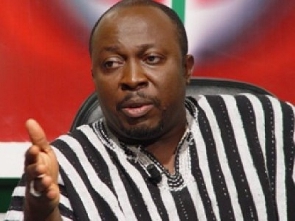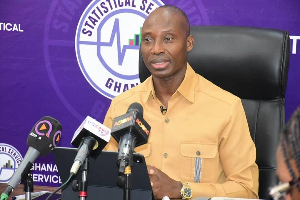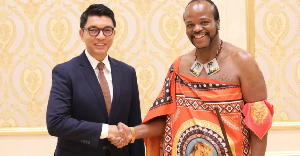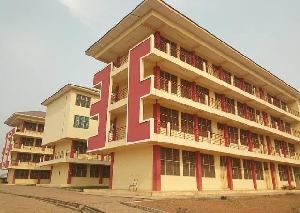Opinions of Wednesday, 6 December 2006
Columnist: Bannerman, Nii Lantey Okunka
Making A Case For Diasporans In Leadership
Currently, it is not unheard off to notice the broad classification of Ghanaians into two groups. The Diasporan and the Stay-at-Home Ghanaian. That members of both classifications are Ghanaian cannot be disputed. The main differences in my opinion are the acculturation of Ghanaians who live outside the country and the question of financial plus other resources. Most Ghanaians work hard overseas to accomplish their dreams. I hope the profligacy of these drug barons and other criminal elements will not give the false impression that one can easily make it overseas without working hard and modifying his or her life style. Note that some go overseas but do not make it! Hopefully, we will create at home, the systems that we need and pillar them with the work ethics that make us “successful” overseas. That is the challenge!!
Why is it that when it comes to leadership, some Ghanaians continue to nag endlessly about the readiness of a diasporan to lead? Why is this warped notion taking center stage in Ghana? Have these people really studied the kind of people who led constitutionally in the past? Why should a Ghanaian who lives outside the country be portrayed as not ready to lead? Did Nkrumah not live overseas? Did Busia not live overseas? Did Limann not live outside? Did Kufour not live overseas? Did Arkaah not live overseas? Must I cloy you with endless names? Overseas experience, to bet, has been a study diet in our leadership experience. Therefore, why this sudden stink? Does anyone really think that living overseas can or will diminish one’s ability to lead in Ghana or elsewhere? In other words, is living overseas a liability when it comes to leadership? Does living overseas make one less of a loving and competent Ghanaian? Why would Ghanaians tolerate leaders who seek the best of everything overseas and on the dole to add, yet frown upon would-be leaders whose sin is to have lived and worked outside the country on merit and out of necessity? Some left just to save their lives and others to survive economically. I would rather have a diasporan leader who lives, works and plays in the Ghanaian system they supervise, than a stay at home Ghanaian who lives and plays outside the Ghanaian system. Often buffeting the tax payer with such odious bills from their out of country engagements.
History is replete with luminaries who lived outside their cultural confines for a period certain, yet returned to serve their folks immeasurably. I am reminded of Dr. Yanus, a Nobel prize winner who studied overseas yet returned home to lead by creating the Grameen system in Bangladesh. If we are talking about effective leadership, and I hope that is what is at stake here, then we better focus on the leadership qualities and potential of a would-be leader instead of where he or she currently resides. Let us not allow this distraction to be the archenemy of some fine leadership potentials in our midst. Indeed, it takes a very committed and caring Ghanaian to leave everything overseas and head home to serve his or her country. What baffles me is this constant call to return home yet when some want to return and lead, others mischievously, if not maliciously, question whether a diasporan is fit to lead. Please permit me to make a few points in defense of any diasporan who wants to go home and serve in a leadership capacity. And yes, this includes the presidency by all means!
Just as companies go out and hire outside consultants, Ghana may not be worse off by giving its own diasporan folks a chance to lead. In this case, the country is getting more than an outside consultant. The country is getting a true son or daughter who understands the culture and wants to see the country do well. Outside perspective is vital to leadership. Indeed, it becomes more critical since change is a key challenge in our context. You see, when you visit Ghana, coming from outside the country, you see things that resident Ghanaians may not pay attention to. This is not an indictment of our brothers and sisters who are focused on survival. Rather, such fresh outside viewpoints gives one a good idea of the reality or priorities of those who live there on a day to day basis. Ultimately, it opens our eyes to the opportunities and challenges that can and ought to be dealt with. That fresh outside perspective, if used constructively, can benefit the country immensely. It takes a leader to note those opportunities and challenges and then engage the residents to solve these problems. In the end, it is the leadership qualities and abilities that matter not whether the person lived/lives in Mars or Jupiter.
Ghana’s idea of prosperity is not different from that of the west or other prosperous places. We all want a nice house, cars, clean environment, civil communities, good schools, clean and functioning hospitals, an informed populace and a functioning meritocratic democracy. Here, those who have lived in Ghana as well as overseas may have an edge over a leader who has not seen both sides. It is one thing to read about models in far away places and another to experience these models firsthand. I believe it ought to be easier for a would be president with overseas experience to project a vision that they’ve lived in real life elsewhere. Though the culture in Ghana has a way of choking off relevant overseas experience, the experience itself can be beneficial to those who want and care to lead. So the issue is not just gaining the experience outside but applying it locally to effectively produce results. Take job creation for example, is it not easier to experience how that whole economic process unfolds in a pay for work system? Can we say the same for our situation in Ghana? What about customer service? Do you get my drift? The bottom line is that we need one who can implement ideas and experiences. Fortunately, this has nothing to do with where one lives.
One of the most sought after values in leadership today is cross-cultural experience. After all, the global village reality is thriving vibrantly. Ghana needs her global partners to take off developmentally. A leader with overseas experience should be in a bold position to deal with our global partners. Understanding how other cultures work and working in other cultures is a huge advantage when negotiating deals outside the country. Of course one needs fundamental negotiation skills but in the end, it won’t be what you know but how well you relate to your partners and articulated your case. This is not about the details of the pact or deal but one’s ability to build a relationship based on a keen understanding of your partner’s culture and preferences. One’s ability to transfer relevant experiences into action in our Ghanaian context is what we really ought to look out for not where they live or lived. For example, anyone who has worked in the west knows about their time orientation. Therefore, being late to a meeting is certainly a recipe for disaster. It will soil the atmosphere and create the impression of triviality to the westerner. Note that it is one thing knowing this and another, applying the knowledge. So the test should be one’s ability to apply the knowledge and experience so gained.
Please let me make something abundantly clear. I am not by this argument saying that a diasporan is the only person fit to lead country Ghana. Not at all!! All I am saying is that we should not tolerate the harassing of diasporans because they live or have lived outside Ghana. Let every Ghanaian, regardless of where they live, be free to contest any election so long as they qualify to do so. I know a lot of diasporans who are better schooled on the issues than those of our brothers who live in Ghana currently. I also know diasporans who visit Ghana at least once every year. With the help of technology, one is able to keep up with events in Ghana. So, if circumstances should force one to be away from Ghana, why must he or she be questioned about readiness to lead? After all, is one not in a better position to improve his or her leadership skills in a resource rich country like the US or Britain? Additionally, a good leader is one who is able to assemble a top notch team to get the job done. A diasporan leader, assuming he is lacking in matters solely Ghanaian or local, will have at his disposal, officials who are hopefully better schooled on local political issues. So what really is the beef here? Is there more to it than meets the eye?
What I find hilarious is this, when Ghana needs help, it looks no further than overseas. France recently gave a 55 million Euro loan to help support Ghana’s budget. How much will Britain and America give? What about China, Japan and other countries? When these politicians need funding, don’t they ask diasporans for help? So it is ok for diasporans to pour their resources into Ghana but they have to be questioned if they want to lead? Is it ok to pour 8 billion dollars, that is if the president’s figure is true, into Ghana but be denied leadership opportunities? This despicable notion that the diasporan is only primed for fleecing ought to be expunged from our national psyche. Diasporans are just as Ghanaian as our families and friends. I just don’t understand the obstreperous position of some on this troubling issue. Could there be a recondite reason for this yelp?
Often, help comes with conditions from folks who have never set foot in Ghana. With a wry smile, we accept help without much consternation. The latter is ok by our brothers and sisters who live at home. So long as the bacon comes home, all is quiet. Why such a fuss if our own flesh and blood want to come home and lead? Is this effort not the same help? Oh I see, there is no 10% to be gained here right? Can we really put a premium on what such selfless efforts are worth? Just imagine the skills and knowledge transfer that we stand to obtain for free. Is it not self hatred to despise our own yet embrace foreigners? Folks, let us open our doors to all the sons and daughters of our country who want to come home and help/serve. Just as the Israelites went home after years in Egypt, all Ghanaians must be welcomed home with flowers to play their role in building our country. If one’s leadership prowess places him or her in the presidency, so be it. I have not seen anything substantively different to make me believe that a Stay-at-Home Ghanaian is more competent or indeed, has any advantage over a diasporan. To even make this comparison makes me sick! We must put a kibosh on this form of divisiveness.
In the end, we must keenly look at the skills, abilities, experiences and knowledge of the would-be candidate in making our choice. What is their vision and how will they actuate that vision? Are they informed on the issues? What experience do they have? Can they be trusted to do what they promise? Do they identify with the people they want to lead? Do they understand how jobs are created? Do they understand what customer service means? Are they willing to streamline the civil service? How do they intend to invoke effective governance at the local level? Are they willing to champion changes to our knot-ridden constitution? Will they look at development, inside out, instead of outside in? These and many more are the issues that must define the debate on who leads Ghana come 2008. We must not focus on whether one is a diasporan or stay at home. So long as one is Ghanaians and is willing to compete, his or her current place of abode should not be an issue.
My wish for our new leaders, come 2008, is what is laid out in a book by Kouzes and Posner called, the Leadership Challenge. In it, these gentlemen maintain that a leader must be able to model the way, inspire a shared vision, challenge the process, enable others to act, and encourage the heart. They define leadership as “the art of mobilizing others to want to struggle for shared aspirations”. Taking people to new horizons!
Model The Way: a) Find your voice by clarifying your personal values. b) Set the examples by aligning actions with shared values.
Inspire the vision: a) Envision the future by imaging exciting and ennobling possibilities. b) Enlist others in a common vision by appealing to shared aspiration.
Challenge the process: a) Search for opportunities by seeking innovative ways to change, grow, and improve. b) Experiment and take risks by constantly generating small wins and learning from mistakes.
Enable Others to Act: a) Foster collaboration by promoting cooperative goals and building trust. b) Strengthen others by sharing power and discretion.
Encourage the Heart: a) Recognize contributions by showing appreciation for individual excellence. b) Celebrate the values and victories by creating a spirit of community.
Let us, my brothers and sisters, come together as one and move this beautiful country of ours forward. In unity, our strength radiates and our crusted purpose becomes lucidly focused. The task at hand is difficult and daunting. We certainly will need all hands on deck. Now is not the time to exclude anyone with a good heart and an itching pair of hands. We need all the good leaders we can lay hands on. Let everyone contribute based on their God given talent. Together, and united in purpose, we will drag Ghana and hoist it on the pedestal that it deserves. Mother Ghana bacons and we must heed the call steadfastly. A Ghanaian must always be a Ghanaian no matter where he makes a living or rest his tired head. Stop the divisive tactics! Viva Ghana!















